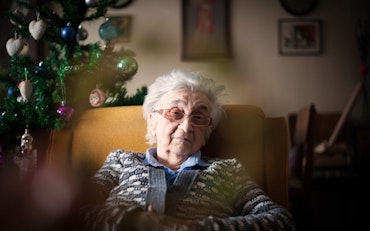New app to create dementia-friendly home
Alzheimer’s Australia Victoria has launched a new app providing carers with ideas to make their home more accessible for people living with dementia.

Dementia-Friendly Home app user Norm Smith at the launch
Based on 'Ten Dementia Enabling Environment Principles”, the Dementia-Friendly Home app recommends practical changes that prompt a carer to think about how the home can be changed in a way that may assist the person living with dementia.
Maree McCabe, chief executive officer of Alzheimer’s Australia Vic, says most people are not aware that people with dementia may experience spatial and visual challenges as well as the more commonly understood memory issues.
“Changes in the brain can impact on day to day functions and potentially confuse people living with dementia. Identifying ways the home and environment can be modified to ameliorate any challenges will make a difference to the person living with dementia,” Ms McCabe says.
With 70 percent of people with dementia living in the community, the app enables the home to be made more dementia-friendly. This can allow the person to stay in their own home, enjoy their regular lifestyle activities and remain engaged with their community for longer.
“This app aims to enable people living with dementia to maintain their independence and continue living at home. It may also help build on their self-esteem, which can have a profound impact on the quality of life for a person living with dementia, as well as families and carers,” says Ms McCabe.
Through a floorplan of a house the app ‘walks’ you through different rooms in a house and in every room it will tell you what things could be a stumbling block for people with dementia and make suggestions to change that.
Many of the app suggestions are small, inexpensive ideas, such as placing labels with pictures on cupboard doors. More significant changes include installing motion sensors that turn lights on and off when people walk through the house and changing busily patterned wall or floor coverings.
Norm Smith, a carer, says he wanted to help his wife Cathy, 53 and living with dementia, to feel comfortable in their family home.
“Using the app affirmed ideas I’d had around labelling cupboards and keeping floors and hallways clear and well lit.
“The app has also shown me things that I didn’t know and didn’t think about of being an issue around the house.
“We keep thinking dementia is all about forgetting things, but it’s also about recognising things. There are certain things Cathy can look at but she doesn’t actually recognise what she’s looking at. Every day things are a challenge for her,” Mr Smith explains.
“I’ve put notes up in the kitchen so Cathy knows where to find things, I’ve bought an iron that shuts itself off if it’s not used in case she forgets to switch it off. Cooking is an issue for me and I’m looking at a mechanism that will shut off the gas if it is left on. And when cleaning the house I know Cathy gets unsettled if I pack things away because she thinks her things are gone.

“Using the app has also made me realise I need to try to pre-empt situations that could be challenging for Cathy when we visit other people’s homes or our church.
“Basic things that you and I would find easy around the home are pretty difficult for Cathy. I don’t know what she sees. The app has helped me to try and understand and now I keep thinking of 'what would she see’.
“Enabling Cathy to remain involved in the daily routine, even just being able to make a cup of tea for herself and guests, to contribute to the household planning and activity is really important to us and impacts positively on her and our family,” says Mr Smith.
“The app is informative and gives you a different way of looking at your environment. It prompts your way of thinking about how you can adapt your living space. It makes you understand something might be an issue and helps with ways to fix it.
The Dementia-Friendly Home app was developed through funding by the joint Commonwealth and State Government Home and Community Care program. The Deakin Software and Technology Innovation Laboratory (DSTIL) worked with Alzheimer’s Australia Vic to develop this technology.
Deakin University researcher Professor Rajesh Vasa says “It is really exciting to be able to use our expertise in interactive, gaming and virtual reality technologies to support Alzheimer’s Australia Vic’s core mission of education and understanding of the reality of dementia.”
“This app provides valuable support to carers of those living with dementia and we are delighted to have been involved in this very important project.”
The Dementia-Friendly Home app is now available for iPad from the App Store and Android tablets from the Google Play Store for $2.99. View the app in action in the clip below.










